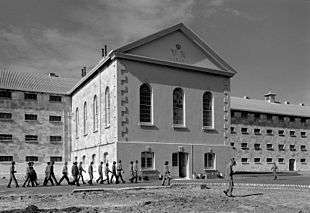Prison slang

Prison slang is an argot used primarily by criminals and detainees in correctional institutions. It is a form of anti-language.[1] Many of the terms deal with criminal behavior, incarcerated life, legal cases, street life, and different types of inmates. Prison slang has existed as long as there have been crime and prisons; in Charles Dickens' time it was known as "thieves' cant". Words from prison slang often eventually migrate into common usage, such as "snitch", "ducking", and "narc".
Examples

Prison slang, like other types of slang and dialects, varies by region. For that reason, the origins and the movement of prison slang across prisons are of interest to many linguists and cultural anthropologists.
Some terms used in current prison slang are quite old. For example, "to cart", meaning to transfer to another prison, has been in use in Glasgow since 1733.[1]
A two-year study was done by Bert Little, Ph.D. on American English slang with the main focus being in the coastal plain region of the Southeast U.S.[2] His study published by The Trustees of Indiana University on behalf of the Anthropological Linguistics journal goes on to provide an extensive glossary of common prison slang terms that he found circling through the prison systems. Below is a list of examples included in the glossary:[2]
| TERM | DEFINITION |
|---|---|
| Bagman | Someone who is in possession of drugs |
| Bang[3] | A drug injection (other terms include fix, hit, shot) |
| Chester | Slang term for an inmate incarcerated for child molestation |
| Chomo | Also a slang term for an inmate incarcerated for child molestation |
| Green | A term for paper money |
| Iced | A term for killing another inmate or prison guard |
| In the hole | When an inmate is separated from the other inmates by the authorities in a separate, isolated unit |
| Longjohn | A person who is not incarcerated and is having sexual relations with an inmate's wife |
| Rat | The equivalent as a snitch; an inmate who informs prison officials of any illicit activity within the prison system including prisoners and guards |
| Shank | A knife or some functional homemade instrument that can used for the same functionality of a knife |
| Snuffed | A term for anyone who has been murdered |
| Seg | A term meaning solitary confinement (from the official term "administrative segregation") |
Studies by Alicja Dziedzic-Rawska from the Maria Curie-Skłodowska University in Poland describe prison slang as "extremely rich and creative"[4] with new words being formed on a daily basis. These are mainly used as a means of security against unauthorized parties from receiving a certain message and, in some cases, can be a way to ensure a prison inmate's survival within the cells.[5]
UK common terms
| TERM | DEFINITION |
|---|---|
| Screw | Prison Officer - probably originating from a Victorian form of punishment involving a wheel to be turned on which a screw could be turned to make it more or less difficult. |
| Nerk/Nirk | Stupid/unpleasant person/inmate. Term of abuse used to the face. |
| Nark | Squealer |
| Nonce | A person in prison for offences against children. |
| Pompey | Northern England slang for a prison,[6] possibly originating from a notorious prison ship named Pompee, that was anchored in Portsmouth Harbour in the early nineteenth century. |
| Porridge | one time main meal (alleged) used as term for doing a prison sentence. Popularised by the popular BBC series "Porridge" - which in turn popularized many prison slang words. |
| Rat | Squealer |
| Snout or Burner | A cigarette |
| Squealer | Anyone who gives information to another group - primarily to the prison authorities. |
See also
References
- 1 2 Mayr, A. 2012. Prison Language. The Encyclopedia of Applied Linguistics.
- 1 2 Little, Bert (Summer 1982). "Prison Lingo: A Style of American English Slang". Anthropological Linguisitcs. 24: 206–244. JSTOR 30027838.
- ↑ Devlin, Angela (1996). Prison Patter: A Dictionary of Prison Words and Slang. Waterside Press. ISBN 9781872870410.
- ↑ Dziedzic-Rawska, Alicja (2016-07-27). "Linguistic creativity in American prison settings". Lublin Studies in Modern Languages and Literature. 40 (1): 81. ISSN 0137-4699.
- ↑ Dziedzic-Rawska, Alicja (Spring 2017). "Linguistic creativity in American prison settings". LUBLIN STUDIES IN MODERN LANGUAGES AND LITERATURE 40(1), 2016.
- ↑ https://www.theguardian.com/notesandqueries/query/0,5753,-2010,00.html?gusrc=gpd
External links
| Look up Appendix:U.S. prison slang in Wiktionary, the free dictionary. |